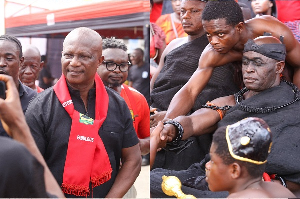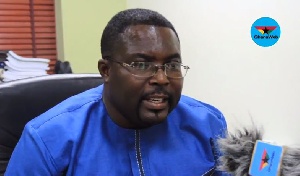Nsawam (E/R), Dec. 7, GNA - Mrs Susan Mensah, Deputy Eastern Regional Minister, on Thursday asked Prison Authorities in the Region to inform the Regional Co-ordinating Council (RCC) about female offenders, who were about to be discharged from prison.
This, she said, would enable the RCC to work out something from the Women Development Fund at the Ministry of Women and Children Affairs for them, adding that, this should be done early enough, so as to help the recipient to access government interventions before they were discharged. Mrs Mensah was sp eaking during the inauguration of the Eastern Regional branch of the Prison Ladies Association (PRILAS) at the forecourt of the Nsawam Female Prison. The Deputy Minister said she was very happy with the theme, "Helping to Re-integrate the Female Offender into Society: The Role of PRILAS", which she said tied in with the Government's policy of rehabilitating ex-convicts. She said though some individuals, nongovernmental organisations, religious bodies had been doing a lot to support inmates, with the coming of PRILAS and other like-minded organizations, conditions and welfare of inmates, particularly female offenders would be improved. Mrs Mensah later launched PRILAS (E/R) Endowment Fund to raise funds for the rehabilitation of female offenders when they left prison.
She said often many of the ex-convicts found themselves back in prison for want of anything to do and thereby going back to crime. Mrs Emma Sawyerr-Laryea, Assistant Director of Prisons and President of PRILAS 96 Eastern Region, said it was time that female prison officers stood up and made their voices heard and also to contribute their quota to the development of the nation. She said they had coiled into their shells for far too long, hence the formation of PRILAS.
Mrs Sawyerr-Laryea said among the aims and objectives of the PRILAS were organizing all Female Prison Officers in the country under one umbrella to promote healthy working relationship; help to unearth and develop hidden potentials and capabilities of members through relevant training programmes; counselling and other services to inmates and acting as role models and mentors to enable them to reform. She said the role of PRILAS in the re-integration process of the female offender started right from the day she was placed in custody where most of them felt neglected. "This is when PRILAS comes in to provide help that would assist them to adjust and adopt." Mrs Sawyerr-Laryea said most of the convicts were illiterates, with no formal education or trades, therefore, no gainful employment, so it was the Prison Officers' duty to encourage and ensure that they took advantage of and made full use of the facilities available. She said the Eastern Region PRILAS comprised of female officers working at the male and female prisons of Nsawam, Akuse, Koforidua and Forifori Camp Prison in the Afram Plains. Mrs Dede Badu-Addo, Gender and Organisational Development Advisor of SNV-Ghana, an NGO, who chaired the function called on the public to donate to the endowment fund so that PRILAS could achieve its laudable objectives.
She called on PRILAS to open up the doors of their prison to the media so as to demystify the prisons. Other members of the executives members are, Mrs Elizabeth Adombire, Vice President; Mrs Victoria Adzewoda, Secretary; Ms Dora Annang, Vice Secretary, and Mrs Yayra Ashong-Mettle, Financial Secretary.
The rest are Ms Justina Opoku, Vice Financial Secretary; Ms Alice Twumwaa, Organising Secretary; Mrs Charity Araba Magnusen, Welfare Officer, and Ms Comfort Okantey; Ms Doris Nipaa and Ms Alberta Hammond are Executive Members. 7 Dec. 06
Regional News of Thursday, 7 December 2006
Source: GNA
















